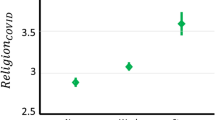Abstract
Growing concerns about anxiety associated with COVID-19 have led to recommendations for effective self-care, and greater availability of mental health treatment. At the same time, existential concerns raised by the pandemic suggest the importance of religious resources, as seen in research into the experience of patients dealing with advanced cancer.
Similar content being viewed by others
Avoid common mistakes on your manuscript.
The current COVID-19 pandemic presents unprecedented physical and economic challenges. Many suffer from uncertainty, fear of infection, moral distress and grief, often experienced alone. There is increasing concern about coping with the resulting anxiety, as well as with its long-term individual and collective impacts.
In this crisis experts recommend that we establish daily rhythms; remain mindful, self-compassionate and active; connect with others; find sources of joy and inspiration; and do what we can to be of help. As in dealing over time with major stressors such as cancer, we are also advised to hope for the best while preparing for the worst, make our hopes realistic, and align our goals with our core values. Clinicians who work with cancer patients are aware of the particular ways that a serious illness can affect someone who has cared for a parent with cancer, or is vulnerable to anxious depression. We are already seeing ways that COVID-19 can heighten anxiety in those with a history of traumatic isolation, or OCD, or chronic schizophrenia with a need for predictable routines. Such forms of anxiety typically benefit from targeted support, behavioral interventions such as mindfulness and CBT, and/or medication.
The current pandemic, like the onslaught of cancer, also evokes in many of us a deeply rooted, existential anxiety experienced as a threat to our accustomed identity, and to our sense of place in the world. The virus’s rapid worldwide spread engenders a confrontation with our selves, with who we are as a society, and with our assumptions about where we can ultimately place our trust (https://www.nytimes.com/2020/04/02/us/coronavirus-apocalypse-religion.html). Many of the questions it raises in these areas have religious, rather than scientific answers. Our spiritual traditions offer insight into who we are: created and/or interdependent, beautiful and broken, both lamenting our suffering and called to respond to the suffering of others. Our spiritual practices connect us with these realities in bodily and collective ways.
Research is not yet available on the full impact of COVID-19, but studies have shown that the majority of cancer patients, whether or not they identify as religious, experience spiritual concerns (Alcorn et al. 2010); that being at peace with God is among the highest priorities of patients facing death (Steinhauser et al. 2000); and that spiritual care provided by the health care team is associated with better quality of life (Balboni et al. 2010) and less aggressive care at the end of life (Balboni et al. 2007).
Anxiety caused by COVID-19 calls for optimal self-care and accessible mental health services, but also for serious attention to how we can pursue Peace (Shalom, Salaam).
References
Alcorn, S. R., Balboni, M. J., Prigerson, H. G., Reynolds, A., Phelps, A. C., Wright, A. A., et al. (2010). “If God wanted me yesterday, I wouldn’t be here today”: Religious and spiritual themes in patients’ experiences of advanced cancer. Journal of Palliative Medicine, 13, 581–588.
Balboni, T. A., Paulk, M. E., Balboni, M. J., Phelps, A. C., Loggers, E. T., Wright, A. A., et al. (2010). Provision of spiritual care to patients with advanced cancer: Associations with medical care and quality of life near death. Journal of Clinical Oncology, 28, 445–452.
Balboni, T. A., Vanderwerker, L. C., Block, S. D., Paulk, M. E., Lathan, C. S., Peteet, J. R., et al. (2007). Religiousness and spiritual support among advanced cancer patients and associations with end-of-life treatment preferences and quality of life. Journal of Clinical Oncology, 25, 555–560.
https://www.nytimes.com/2020/04/02/us/coronavirus-apocalypse-religion.html. Accessed 4/11/20.
Steinhauser, K. E., Christakis, N. A., Clipp, E. C., McNeilly, M., McIntyre, L., & Tulsky, J. A. (2000). Factors considered important at the end of life by patients, family, physicians, and other care providers. JAMA, 284, 2476–2482.
Author information
Authors and Affiliations
Corresponding author
Ethics declarations
Conflict of interest
I have no relevant conflicts of interest.
Ethical standard
This paper was written in compliance with my institution’s ethical standards, and without a source of funding.
Additional information
Publisher's Note
Springer Nature remains neutral with regard to jurisdictional claims in published maps and institutional affiliations.
Rights and permissions
About this article
Cite this article
Peteet, J.R. COVID-19 Anxiety. J Relig Health 59, 2203–2204 (2020). https://doi.org/10.1007/s10943-020-01041-4
Published:
Issue Date:
DOI: https://doi.org/10.1007/s10943-020-01041-4



